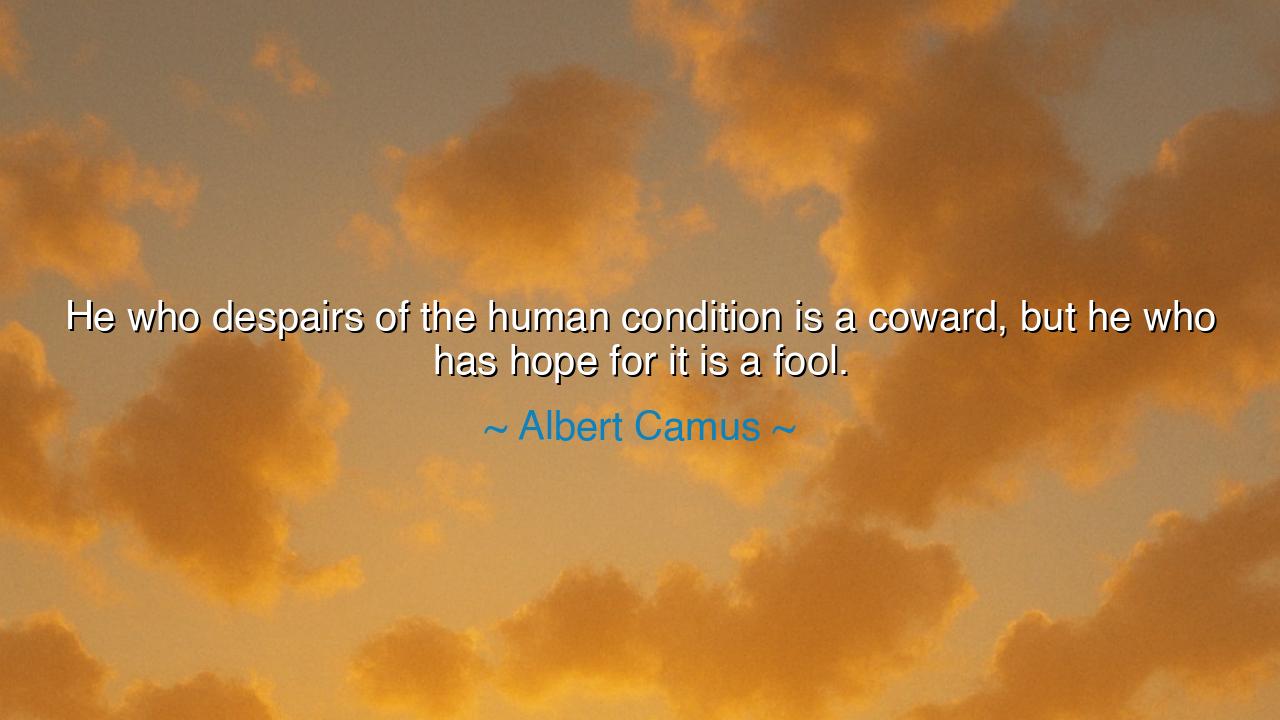
He who despairs of the human condition is a coward, but he who
He who despairs of the human condition is a coward, but he who has hope for it is a fool.






“He who despairs of the human condition is a coward, but he who has hope for it is a fool.” Thus spoke Albert Camus, the philosopher of the absurd, the poet of rebellion, whose words cut like cold wind through the fog of illusion. In this haunting declaration lies a paradox as sharp as a blade — a truth that pierces both despair and hope alike. Camus does not speak to mock the dreamer or to glorify the cynic; rather, he calls humanity to a deeper courage: to see the world as it is, neither blinded by despair nor deceived by false hope, and yet to continue living with dignity, defiance, and love.
The origin of this quote rests in the heart of existential thought, born amid the ashes of the twentieth century — an age when faith in progress, reason, and morality had collapsed under the weight of war and atrocity. Camus, a witness to the suffering of his time, understood that to live is to confront absurdity — the eternal conflict between our longing for meaning and the universe’s indifference to that longing. In such a world, to despair is tempting; it offers escape, a kind of surrender to nothingness. Yet to hope blindly, to believe that some divine or historical force will save us, is to live in delusion. Thus, he names despair cowardice and hope foolishness, for both flee from the truth — one through resignation, the other through fantasy.
But Camus, though he strips hope and despair bare, is not without compassion. Beneath his stern words burns a love of life fierce and unyielding. His message is not one of nihilism, but of revolt. He teaches that though the human condition is tragic, it is not meaningless. To live without illusions and still affirm life — that is the heroism he demands. The one who neither despairs nor hopes, but continues to act, to create, and to love despite the futility of all things, achieves a kind of victory over the absurd. For even if the universe offers no comfort, our actions give it light.
Consider the story of Prometheus, the ancient titan who defied the gods to bring fire to humankind. He knew his rebellion would bring eternal torment — his liver devoured daily by an eagle — yet he acted nonetheless. Prometheus neither hoped for divine mercy nor despaired of humanity’s fate. He simply did what he believed must be done. In this, he embodied the spirit of Camus’s teaching: that true courage lies in action without reward, in persistence without promise. Prometheus is not the fool who believes his suffering will end, nor the coward who curses existence; he is the eternal rebel, who accepts both the horror and the glory of being alive.
Camus himself lived this way — not in ivory towers, but in resistance and rebellion. During the Second World War, when France was under Nazi occupation, he joined the underground press, risking his life to write words of freedom in a time of fear. He knew that tyranny might triumph, that truth might be silenced — yet he wrote. He fought not because he believed victory was certain, but because to cease fighting would be to betray the human spirit. His life was his philosophy made flesh: to live as though meaning could be made, even when none was guaranteed. This is the nobility of the human struggle — to act without illusion, to create beauty in a broken world.
Thus, when Camus calls the despairing man a coward, he condemns his retreat from responsibility — his surrender to the void. And when he calls the hopeful man a fool, he warns against false comfort — the sweet lie that absolves us of struggle. The path of wisdom lies between these extremes, narrow and perilous, but alive with fire. It is the path of lucid endurance, of seeing all — the cruelty, the emptiness, the fleeting joy — and choosing still to stand, to smile, and to say yes to life. This is not the optimism of the naïve, but the defiance of the awakened.
So, my child, hear this and remember: to live well is not to hope for salvation, nor to despair of ruin, but to walk forward with clarity and courage. Do not look for meaning in the stars — make it with your hands. Do not curse the darkness, nor worship the light — carry your own flame through both. When despair tempts you to lie down, stand. When false hope tempts you to dream away your duty, wake. The meaning of life is not given; it is forged in the act of living itself.
And thus, the lesson of Camus’s words endures: the world may not care for you, but you may still care for the world. To see the absurd and still choose compassion — to know the futility and still create — this is the highest form of strength. Neither coward nor fool, become the rebel of the soul, who faces the void not with faith or fear, but with the quiet, unyielding fire of one who dares to live without illusion, and yet, with love.






AAdministratorAdministrator
Welcome, honored guests. Please leave a comment, we will respond soon